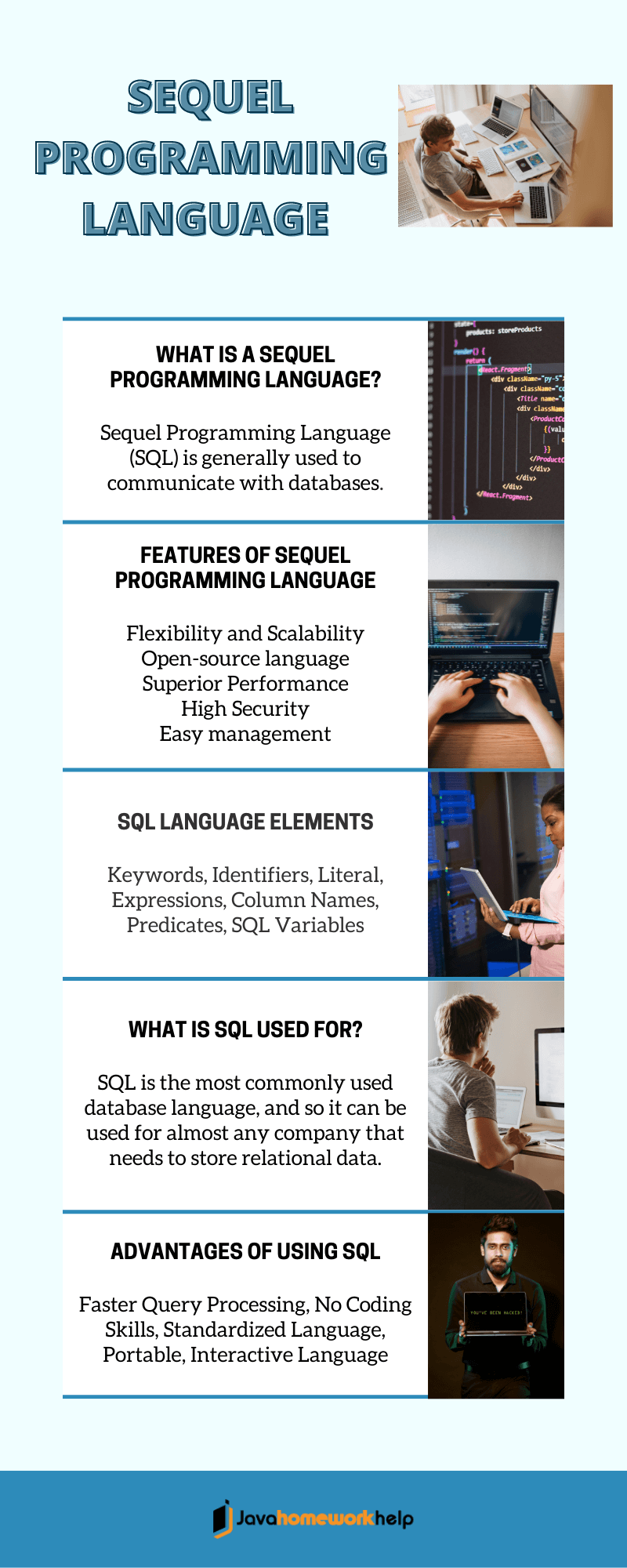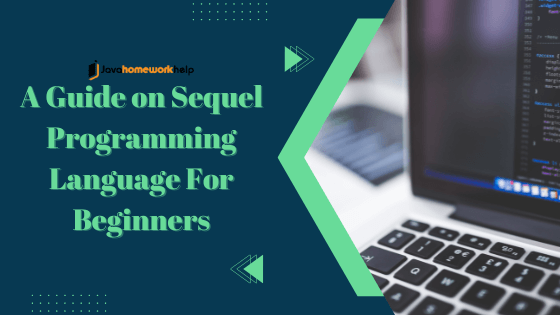Numerous apps and organizations utilize Sequel Programming Language, a special-purpose programming language designed for managing data in a relational database. Nowadays, sequel programming languages are used widely almost everywhere. This is why, the greatest investment you can make in yourself is to learn SQL programming. It will be helpful in your profession and may help you earn more money as well. However, newcomers are often unsure of where to start when it comes to learning the Sequel programming language.
Although, learning SQL completely depends on your ability, desire, and efforts. Some students find it difficult to learn and however, many get their own way of learning such language. However, we also can’t neglect that mastering a database language like SQL will expand a programmer’s skill set and employment options. But the question arises of where to start learning a sequel programming language?
Therefore, without getting too technical, JavaHomeworkHelp.com will provide some advice on how to learn SQL so you can get started right away.
What is a Sequel Programming Language?
Sequel Programming Language (SQL) is generally used to communicate with databases. It serves as the foundational language for relational database management systems. The letters S, Q, and L can also be used instead of the acronym, which is pronounced like the word sequel.
IBM created SQL in the 1970s for use with System R. Along with being an ISO and ANSI standard, it is the de facto standard. In 1986, basic language constructs for creating and modifying data tables were made available by the first SQL standard. Afterward, Language enhancements for referential integrity and generalized integrity requirements were added in the 1989 edition.
SQL commands are needed to carry out tasks like updating data and getting data from the database. A few examples of relational database management systems that make use of SQL are Sybase, Oracle, Access, Microsoft SQL Server, Ingres, and others.
However, it is impossible to understand Sequal programming language alone. You might need help with it ti understand properly. In such a case, you can take help with SQL language from experts online. Moreover, you can also take assistance with other programming languages such as Java assignment help or help with C++ language or so on.
Read Here: Different Types of Coding Languages

Features of Sequel Programming Language
For Students learning SQL, it is crucial for them understand that SQL is a special-purpose database programming language that aids in the generation of valuable strategies from a database and can readily interact with enormous and massive databases, regardless of size.
Here are some of the key features of SQL that make it a successful database programming language:
- Flexibility and Scalability: New tables can be easily created, while existing or unused tables in a database can be eliminated or destroyed.
- Open-source language: Because it is an open-source language, it is highly affordable for students because they don’t have to pay for the software.
- Superior Performance: High transactional, high workload, and high usage database systems can benefit from SQL’s high-performance programming skills.
- High Security: One of SQL’s noteworthy qualities is its high level of security. Giving permissions for views, procedures, and tables is simple. Therefore, SQL offers your data the highest level of protection.
- Easy management: The regular and popular SQL commands “Select,” “Create,” “Insert,” “Drop,” “Update,” and “Delete” assist in managing vast amounts of data from a database fast and effectively.
So, these are the major features of Sequel Programming Language that makes it first priority for organizations to use. However, if you are studying this language and not able to grasp any of its concept then it is a wise you make to hire an expert to help you. You can ask him or her to do my SQL assignment. Other than this, you can also say them to do my java project, and other programming assignments or projects as well.
Basic SQL Language Elements
Statements with keyword or command beginnings are used to construct SQL. Language elements that are common to numerous SQL statements are discussed below.
Keywords
There are one or more keywords in every SQL statement. Although the documentation always uses uppercase to denote keywords as SQL does not care about case.
For instance, SELECT and FROM are terms in the following sentence.
SELECT *
FROM Employees
Identifiers
A token that is used to create a name is called an identifier. Host IDs and SQL identifiers are the two categories of identifiers. The name of a host variable is created using a host identifier, as opposed to all other identifiers, which are SQL identifiers.
Literals
Literals are numerical values or texts used as constants in SQL. They can be divided into:
- Character string literals (CHARACTER or CHAR)
- Numeric literals, which is further divided into Integer (INTEGER or INT), Decimal (DECIMAL or DEC and NUMERIC), and Floating-point (FLOAT, REAL and DOUBLE PRECISION.
Expressions
The parts of a query that compare one or more values to other values are called SQL expressions. They are also capable of numbers. Expressions are used in a wide variety of contexts.
However, you are only allowed a certain number of modifiers and recursions in an expression. You should be aware of the following two limitations:
- The first limit is set based on the stack that the expression has access to. At least 100kb of free stack are needed for Vertica. The error may be thrown if this limit is reached or exceeded.
- The number of possible recursions in an analytical phrase is the second restriction. 2,000 is the maximum limit.
Column Names
A column of a table or view is identified by its column name. The name may or may not be qualified. Both the column name and the first character must be alphanumeric. Underscores (_) but not hyphens are permitted in the name ( – ). Most importantly, a column’s name should not contain a keyword.
Predicates
Predicates serve as truth-checks. A value is returned if the predicate test is successful. Since each predicate is assessed for each row, a table SELECT statement containing a predicate may yield more than one result.
Predicates are made up of a number of arguments and parameters. As an illustration, consider the following WHERE clause:
WHERE name = “Smith”
“Smith” is an expression
name = “Smith” is the predicate
SQL Variables
A variable stated within a compound statement of a SQL Procedure is known as a SQL variable. SQL variables may be used anyplace that expressions are permitted in compound statements. They can’t be utilised in anything other compound statements.
These aforementioned are the basic SQL language elements. You can learn more about these by taking from a sequel programming professional. Other than this, there are many service providers online who can help you with other programming languages as well whether you need java help, help with Python, or even you can also pay someone to do my android project as well online.
Also Read: How to setup JDBC Connection In Java
Courses For Learning Sequel Programming Language – Beginners Level
There are a a variety of courses available online for the students who wants to learn SQL. Various online platforms such as coursera, udemy, etc are offering SQL for beginners. Here are the top online SQL training programs listed below for beginners.
- Code With Mosh’s Complete SQL Mastery
- Udacity’s SQL Nanodegree Program
- Zero to Mastery’s Complete SQL + Databases Bootcamp
- Intro To SQL Course by Khan Academy
- Skillshare’s SQL: Master SQL Database Queries in Just 90 Mins!
- Udemy’s The Complete SQL Bootcamp 2021: Go from Zero to Hero
- Team Treehouse’s SQL Basics
- Coursera’s Introduction to Structured Query Language (SQL)
- Pluralsight’s SQL Server Fundamentals
- Coursera’s SQL for Data Science
- Pluralsight’s Introduction to SQL
- Codecademy’s SQL Course
You can select the course that you think is best for you, but you should make sure that it is the right level for you and has appropriate examples.
Are You Beginner in SQL? Register Yourself in Online SQL Courses
As we already know that with the hit of pandemic where everything turns online. Student now can get a chance to enhance their learning and skills by enrolling themselves in online courses. Therefore, if you are an aspirant looking to learn sequel programming language at your own comfort space, then enrolling yourself in online SQL course is the right option for you.
Online SQL courses will not only help you in clearing your fundamentals but also make you aware of the different SQL strategies and functions. For a beginner, online course in SQL is the best choice. You can take a course that can help you develop your SQL knowledge. Moreover, online SQL classes can provide you with the information, tools, and expertise required to apply for these demanded positions in the current employment market.
Also, you can ask for assistance from our professionals if you are having any issues with your Sequel programming language or any other tasks or homework. We have the best team of experts who are well proficient in solving all the assignments and queries related to any part of SQL. Moreover, you can also take JavaScript help from us that too at an affordable cost.
FAQs
| Q:How long does learning SQL programming take? A: The period of time can be adjusted based on your level of effort, but a typical learner can master SQL’s fundamental query syntax in two to three weeks. |
| Q: Is SQL a programming language? A: SQL is, in fact, a programming language. It includes looping, logical commands, variables, and other features. It isn’t a language, though, in the same sense as something like Java or C++. |
